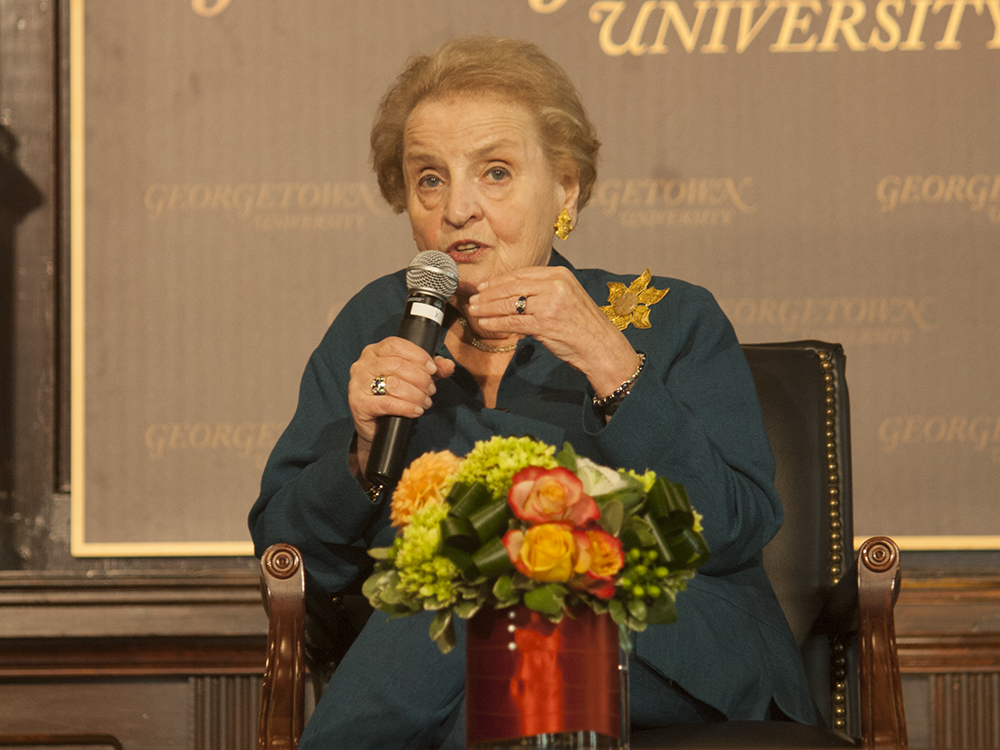
Former Secretary of State and Georgetown professor Madeleine Albright participated in a discussion on the role of women in peacekeeping efforts.
Former Secretary of State and Georgetown professor Madeleine Albright and President of Kosovo Atifete Jahjaga discussed the importance of women’s political participation in peacekeeping in Gaston Hall on Wednesday.
The event, titled “Women Leading Peace,” was held by the Georgetown Institute for Women, Peace and Securities and coincides with the release of a research study by the institute on women’s political participation.
Executive Director of IWPS Melanne Verveer moderated the event and began by asking Jahjaga to explain the roles that women played in peace-building and reconciliation in Kosovo during the Balkan Wars of the 1990s. In her role as secretary of state, Albright participated in peace talks that helped to end the genocide in Kosovo.
Jahjaga said that women in Kosovo played a pivotal role in peacekeeping in the wake of the Balkan Wars.
“Women in our country, they have become a backbone of the society, keeping our society together and organizing them politically in order to resist the regime of Serbia,” Jahjaga said.
According to Jahjaga, women in Kosovo organized humanitarian efforts despite dangers presented by the military and the police. They also helped provide medical care and treatment for wounded children.
“They were organized to go into the most remote villages in our country to [teach] lessons for kids who were not allowed to go to school,” Jahjaga said.
In addition, Jahjaga said that women carried food between villages and larger cities under siege.
“Their message was very simple,” Jahjaga said. “’We don’t have guns. We have bread, and we are going to bring [it] to the children in our villages.’”
Jahjaga also emphasized the role women played in finding and documenting evidence of the human rights violations committed in Kosovo.
Since the war, Kosovo has implemented a quota on government employees, requiring at least 30 percent of public servants to be women.
Verveer asked Albright to discuss the integration of women into peace-building from a perspective outside of the Balkans.
Albright discussed her experience being one of only seven female delegates out of 183 total delegates in the United Nations.
“Because I was an American, I created a caucus [with the other six],” Albright said. “And we called ourselves the G7.”
The group lobbied for women on the war crimes tribunal, according to Albright, and pushed for the U.N. to declare rape a weapon of war.
“Some people don’t like this word anymore, but I am a feminist,” Albright said, eliciting cheers from the audience.
The event moved into a panel discussion, featuring former Chief Commissioner of the Northern Ireland Human Rights Commission Monica McWilliams, former Attorney General of Guatemala Claudia Paz y Paz, Executive Director at the Center for Multi-Party Democracy in Kenya Njeri Kabeberi and Chairperson of the Philippines Peace Panel Miriam Coronel-Ferrer.
McWilliams spoke of the 1996 formation of the Northern Ireland Women’s Coalition, a political party led by female politicians, and of the diverse women with whom she worked to promote peace in her region.
“We were all accidental activists,” McWilliams said. “This is what conflict does.”
McWilliams also said that she encountered many barriers as a woman in peace talks with a male majority.
“Can you believe that I was actually a university lecturer, and I was told to shut up and sit down practically every day that I was at the table? To go home to the kitchen?” McWilliams said.
When Verveer asked Coronel-Ferrer what was difficult about being put into power on the Philippines Peace Panel, Coronel-Ferrer said that party leaders often left women out of negotiations, and they were then forced to get creative with their approaches and compromises.
Coronel-Ferrer said that women on the peace panel would give chocolate to men on Valentine’s Day as a symbol of their equality.
“It provides that women have the right to meaningful political participation. … You just never know what the tools are going to be that you use,” Coronel-Ferrer said.




















